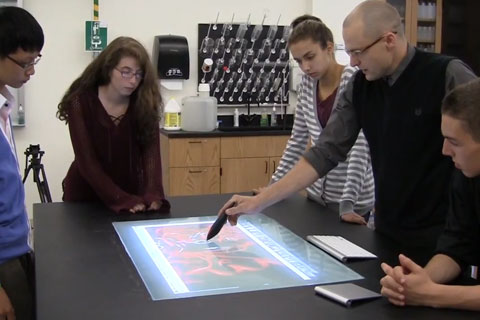
TABLE-TOP TECH At Cushing Academy in Ashburnham, the iPad revolution has been supersized, as
giant touchscreen tables are scheduled to be used in every department this fall. |
Imagine high school without textbooks. Instead of scanning stacks lined with colorful spines, kids carry libraries on sleek black e-readers. Anatomy labs are devoid of bloody frogs — students can simply cut up digital amphibians with finger strokes on a touch screen. Changes like these are happening now, in public and private schools across the state, as Massachusetts embraces the iPad education revolution.
Schools started testing the tablets as educational technology when iPads were brought to the public in 2010. Now districts across the country are buying in bulk, many providing students their very own devices. Apple's third-quarter earnings report for 2012 reveals iPad sales nearly doubling from last year's. Out of 17 million iPads sold globally between April and June, one million of them went to US educational institutions. And in many ways, Massachusetts is on the vanguard of this new ed-tech revolution.
"We went from very few schools really going out on a ledge and saying, 'This is what we want to do,' to today, where I think the majority of competitive Massachusetts schools and districts have some form of a one-to-one program, or are thinking about it," says Damian Bebell, an assistant research professor at Boston College's Lynch School of Education, who studies the ways technology impacts learning. "It's literally exploded in the past 18 months."
Now, kids at Cushing Academy gather around touch-screen lab tables in chemistry class, manipulating molecules with infrared light pens. Burlington High School uses textbook funds to distribute iPads en masse. Starting this fall, Sacred Heart Catholic School students can download scripture on their school-assigned iPads.
While many educators and administrators celebrate the tech shift, Bebell emphasizes the importance of teacher training and support for successful iPad integration.
"You're not seeing McGraw-Hill say, 'We're going to discontinue textbooks,'" says Bebell. But, "there's going to come a point when McGraw-Hill says, 'Jeez, we can make a lot more money selling e-reader versions of our books than cutting down forests and packaging textbooks.' "
Here are ways five different schools are using this technology to innovate classrooms in the commonwealth.
BURLINGTON HIGH SCHOOL: PUBLIC-SCHOOL POSTER CHILD
In the fall of 2011, Burlington High School invested in iPads for the entire student body — a commitment to buying no new textbooks. The school even moved to get rid of computer labs, instead of spending funds on an upgrade.
"You put an iPad in every student's hands with a wireless infrastructure in place, and you have a computer lab in every room," says former principal Patrick Larkin (who transitioned to a new position, assistant superintendent of Burlington Public Schools, on July 1).
From AP Spanish class to after-school band practice, iPads are redefining the high-school experience in this suburban Mass town. No more fumbling with loose pages of sheet music while trying to play the flute — kids can place the iPad on a music stand and flick through bars without missing a beat. They can record AP Spanish oral exams on the iPads — and yes, it's approved by the College Board. Burlington High School students have jumped from three-ring binders to Evernote, Dropbox, and e-mail.